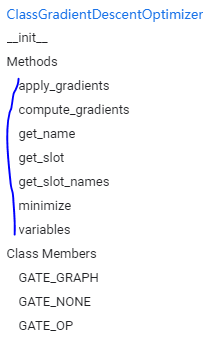转自:https://www.tensorflow.org/api_docs/python/tf/train/GradientDescentOptimizer
1.tf.train.GradientDescentOptimizer
其中有函数:

1.1apply_gradients
apply_gradients( grads_and_vars, global_step=None, name=None )
Apply gradients to variables.
This is the second part of minimize(). It returns an Operation that applies gradients.
将梯度应用到变量上。它是minimize函数的第二部分。
1.2compute_gradients
compute_gradients( loss, var_list=None, gate_gradients=GATE_OP, aggregation_method=None, colocate_gradients_with_ops=False, grad_loss=None )
Compute gradients of loss for the variables in var_list.
This is the first part of minimize(). It returns a list of (gradient, variable) pairs where "gradient" is the gradient for "variable". Note that "gradient" can be a Tensor, an IndexedSlices, or None if there is no gradient for the given variable.
计算var-list的梯度,它是minimize函数的第一部分,返回的是一个list,对应每个变量都有梯度。准备使用apply_gradient函数更新。
下面重点来了:
参数:
loss: A Tensor containing the value to minimize or a callable taking no arguments which returns the value to minimize. When eager execution is enabled it must be a callable.var_list: Optional list or tuple oftf.Variableto update to minimizeloss. Defaults to the list of variables collected in the graph under the keyGraphKeys.TRAINABLE_VARIABLES.
loss就是损失函数,没啥了。
这个第二个参数变量列表通常是不传入的,那么计算谁的梯度呢?上面说,默认的参数列表是计算图中的 GraphKeys.TRAINABLE_VARIABLES.
去看这个的API发现:
tf.GraphKeys
The following standard keys are defined:
找到TRAINABLE_VARIABLES是:
TRAINABLE_VARIABLES: the subset ofVariableobjects that will be trained by an optimizer. Seetf.trainable_variablesfor more details.
然后再去看:
tf.trainable_variables
tf.trainable_variables(scope=None)
Returns all variables created with trainable=True.
When passed trainable=True, the Variable() constructor automatically adds new variables to the graph collectionGraphKeys.TRAINABLE_VARIABLES.
This convenience function returns the contents of that collection.
Returns:
A list of Variable objects.
然后再去看一下tf.Variable函数:
tf.Variable
__init__( initial_value=None, trainable=True, collections=None, validate_shape=True, caching_device=None, name=None, variable_def=None, dtype=None, expected_shape=None, import_scope=None, constraint=None, use_resource=None, synchronization=tf.VariableSynchronization.AUTO, aggregation=tf.VariableAggregation.NONE )
并且:
trainable: IfTrue, the default, also adds the variable to the graph collectionGraphKeys.TRAINABLE_VARIABLES. This collection is used as the default list of variables to use by theOptimizerclasses.
默认为真,并且加入可训练变量集中,所以:
在word2vec实现中,
with tf.device('/cpu:0'): # Look up embeddings for inputs. with tf.name_scope('embeddings'): embeddings = tf.Variable( tf.random_uniform([vocabulary_size, embedding_size], -1.0, 1.0)) embed = tf.nn.embedding_lookup(embeddings, train_inputs)
定义的embeddings应该是可以更新的。怎么更新?:
with tf.name_scope('loss'): loss = tf.reduce_mean( tf.nn.nce_loss( weights=nce_weights, biases=nce_biases, labels=train_labels, inputs=embed, num_sampled=num_sampled, num_classes=vocabulary_size)) # Add the loss value as a scalar to summary. tf.summary.scalar('loss', loss) # Construct the SGD optimizer using a learning rate of 1.0. with tf.name_scope('optimizer'): optimizer = tf.train.GradientDescentOptimizer(1.0).minimize(loss)
使用SGD随机梯度下降,在minimize损失函数中,应该是会对所有的可训练变量求导,对的,没错一定是这样,所以nec_weights,nce_biases,embeddings都是可更新变量。
都是通过先计算损失函数,求导然后更新变量,在迭代数据计算损失函数,求导更新,
这样来更新的。